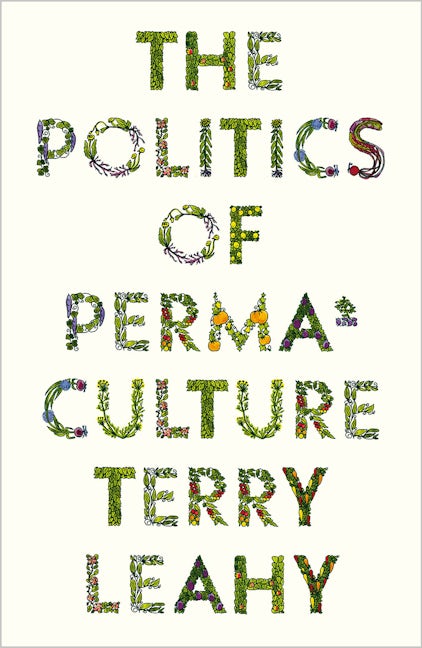
The Politics of Permaculture
Series: FireWorks
A clear introduction to the politics of permaculture, from a renowned writer and practitioner within the movement
'Inspiring. [...] Crammed with lively interviews and grounded examples' Ashish Kothari, founder of Kalpavriksh
Permaculture is an environmental movement that makes us reevaluate what it means to be sustainable. Through innovative agriculture and settlement design, the movement creates new communities that are harmonious with nature. It has grown from humble origins on a farm in 1970s Australia and flourished into a worldwide movement that confronts industrial capitalism.
The Politics of Permaculture is one of the first books to unpack the theory and practice of this social movement that looks to challenge the status quo. Drawing upon the rich seam of publications and online communities from the movement as well as extensive interviews with permaculture practitioners and organisations from around the world, Leahy explains the ways permaculture is understood and practiced in different contexts.
In the face of extreme environmental degradation and catastrophic climate change, we urgently need a new way of living.
This book is available to download through the Open Access programme.
Terry Leahy has been involved in the permaculture movement since its founding in 1978. He has lectured in universities since 1973 and retired at the end of 2016. His recent book, Food Security for Rural Africa: Feeding the Farmers First (Routledge, 2018), outlines a permaculture strategy for Africa and shows how projects can be designed to make this work in practice.
'Based on decades of experience in the Global South and in the Global North, this concise book analyses the multiple dimensions of permaculture as a practice, an ethic, an experience, a worldview, a personal commitment and, for sure, a part of a social movement that will hopefully contribute to a deep change our world very much requires'
- Geoffrey Pleyers, Vice-President of the International Sociological Association and author of 'Alter-Globalization: Becoming Actors in the Global Age' (Polity, 2011)'Some declare that permaculture is the biggest and fastest moving people's movement in the world. Terry Leahy gives us what is possibly the first permaculture book to examine thoroughly permaculture from a sociological point of view and its potential to undermine the systems driving Earth to degradation and immoral social inequity'
- Rosemary Morrow, founder of the Blue Mountains Permaculture Institute and author of 'Permaculture Teaching Matters' (Permanent Publications, 2010)'Critical theorists often restrict themselves to criticizing the prevailing conditions of the system. They rarely turn a critical gaze on initiatives based in solidarity and aiming at transformation. Terry Leahy's book is not only a proof that this is fruitful but a proof that this pathway may lead us to widen the horizon of what transformation can mean'
- Friederike Habermann, author of 'Ecommony: UmCARE zum Miteinander''Inspiring. [...] Crammed with lively interviews and grounded examples showing the relevance of the approach to the Global South, this volume is an invaluable contribution to the growing material on how we can still show ourselves to be truly sapiens, by being responsible stewards of a wonderful, life-celebrating world'
- Ashish Kothari, founder of Kalpavriksh (Environmental Action Group) and co-editor of 'Pluriverse' (Tulika Books, 2019)'A valuable discussion, including connections with class, feminism, colonialism and differing ideas about social change'
- Ted Trainer, author of 'Transition to a Just and Sustainable World' (Environbooks, 2010)'Permaculture has been described as 'a revolution disguised as organic gardening.' That may be so, but vision without political strategy can be empty. Terry Leahy explores the political significance and latent potential of permaculture, which is terrain that has been sorely neglected'
- Samuel Alexander, Research Fellow, Melbourne Sustainable Society Institute and author of 'Wild Democracy: Degrowth, Permaculture, and the Simpler Way' (Simplicity Institute Publishing, 2017)'A lucid sociological analysis, arguing that the permaculture movement is multi-variegated and paradoxical. Highly recommended for readers who are looking for a concise overview of permaculture not only as an agricultural practice but as a pre-figurative experiment'
- Hans A. Baer, University of Melbourne Sustainable Society Institute and author of 'Democratic Eco-Socialism as a Real Utopia: Transitioning to an Alternative World System' (Berghahn, 2017)'This is permaculture revealed in all its splendour [...] an invaluable approach for exploring future strategic pathways'
- Noel Blencowe, long term Co-Team Leader, CERES Environmental Park, Melbourne'Important reflections on theories and practices to address the climate crisis, proving the important role of that progressive social movements have in the development of alternative knowledge'
- Donatella Della Porta, Professor of Political Science and Dean of the Faculty of Political and Social Sciences at the Scuola Normale Superiore, Florence‘Helped deepen my understanding of the movement that has defined my life and shaped that of countless others. It is hard to imagine a better portrait of the movement’
- David Holmgren, co-originator of the permaculture concept and author of ‘Permaculture One’Series Preface
Acknowledgements
Preface
1. What Is Permaculture? Three Perspectives
2. Permaculture as a Social Movement
3. Strategies and Visions
4. Permaculture Practice: Prefiguring System Change
5. Gender and Colonialism
Conclusion: Permaculture Politics
Notes
Index
129mm x 198mm

